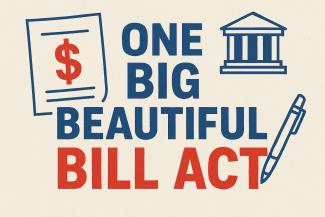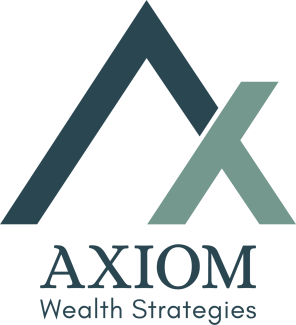
The One Big Beautiful Bill Reviewed
Understanding the “One Big Beautiful Bill” and What It Means for Your Taxes
At Axiom Wealth Strategies, we believe clarity and knowledge are the best tools to navigate change. Recently, our team hosted a webinar to break down the sweeping tax legislation informally called the “One Big Beautiful Bill”, a law set to reshape many aspects of individual tax planning starting in 2025. You can view the whole webinar discussion at the video link on our website (under resources).
Here are the key takeaways you should know:
Tax Brackets & Standard Deduction
- Brackets are permanently extended from the Tax Cuts and Jobs Act (TCJA), adjusted slightly for inflation.
- The standard deduction, which was doubled under the TCJA, has been extended and slightly increased for each filing category. It rises to $15,750 for single filers, $23,625 for Head of Household filers, and $31,500 for married couples filing jointly in 2025, plus an additional $2,000 if over age 65. These higher thresholds may eliminate the need to itemize for many filers.
- A new $6,000 exclusion (per person age 65+) applies for households under certain income levels (for example, this exclusion begins phasing out between $150,000-$250,000 for MFJ).
- These changes all become effective this year and for the future.
Rate | Single | Head of Household | Married Filing Jointly |
10% | $0-$11,925 | $0-$17,000 | $0-$23,850 |
12% | $11,925-$48,475 | $17,000-$64,850 | $23,850-$96,950 |
22% | $48,475-$103-350 | $64,850-$103,350 | $96,950-$206-700 |
24% | $103,350-$197,300 | $103,350-$197,300 | $206,700-$394,600 |
32% | $197,300-$250,525 | $197,300-$250,500 | $394,600-$501,050 |
35% | $250,525-$626,350 | $250,500-$626,350 | $501,050-$751,600 |
37% | $626,350+ | $626,350+ | $751,600+ |
SALT (State and Local Tax) Cap & Itemized Deductions
- The SALT cap is increased to $40,000 for most households starting in 2025, with a 1% increase from 2026-2029, but then reverts to current levels of $10,000 in 2030. There is a new “phasedown” beginning around $500,000 MFJ income that limits deductions to $10,000.
- Business owners may still mitigate SALT limits by electing Pass-Through Entity Taxes (PTETs).
- Mortgage interest stays deductible on up to $750,000 of debt, and private mortgage insurance becomes deductible in 2026.
Child Tax Credit
- Credits are direct dollar-for-dollar reductions in your tax liability, as opposed to deductions that lower taxable AGI (adjusted gross income). The child tax credit increases to $2,200 per qualifying child in 2025.
- Phaseout remains at $200-243,000 for Single and Head of Household, and $400,000 Married Filing Jointly income.
Qualified Business Income (QBI) Deduction
- Section 199A is extended, continuing to provide small business owners with valuable tax breaks if under income thresholds.
Charitable Contributions
- Starting in 2026, there will be a 0.5% AGI floor on charitable deductions and the floor must be exceeded to be deductible. They are also subject to an AGI-based maximum. For very large gifts that exceed that maximum, the deduction plus amount subtracted due to the floor can be carried forward.
- To encourage charitable contributions from non-itemizers, starting in 2025, these filers may deduct up to $2,000 ($1,000 single) for charitable gifts, although donor-advised fund contributions don’t qualify.
New Below-the-Line Deductions
- Tips: Up to $25,000 in tips are tax-free for all filers, however, phaseouts begin at $150,000 for single/HoH and $300,000 for MFJ.
- Overtime premium pay: Exempt from federal tax up to $12,500 for S/HoH and $25,000 for MFJ. Be aware this only covers the portion of the pay that is in excess of normal wages; for example, if you make $20/hr normally, and your overtime is $30/hr, the additional $10/hr would be federal tax free. This also begins to phaseout at higher incomes same as no tax on tips.
- Both tips and overtime are still subject to payroll taxes and also could be subject to state tax!
Vehicle Loan Interest
- From 2025–2028, deduct up to $10,000 of interest on loans for U.S.-assembled vehicles (with income phaseouts). The loans must have been taken out or refinanced after December 31, 2024.
529 Plan Expansion
- 529 funds can now be used for additional K–12 expenses besides tuition (up to $20,000/yr), including homeschooling expenses, tutoring, and standardized testing, as well as fees for postsecondary coursework and professional credentials.
Scholarship Granting Organizations (SGOs)
- Starting in 2027, individuals can claim a 100% tax credit up to $17,000 for contributions to qualified SGOs, directly supporting local scholarships.
Other Key Provisions
- “Trump Accounts”: A new savings vehicle for minors who are US citizens with a Social Security number, born between January 1, 2025, and December 31, 2028, with contributions capped at age 18 and no distributions allowed until after age 18. Investments will be limited to funds that track a US equity index, and funds grow tax-deferred similar to an IRA. Contributions are limited to $5000 annually of after tax dollars, $2500 of which can come from an employer. The federal government will contribute $1000 per child into their account. Parents have the option to opt out of this account.
- Green Energy Credits: $7,500 EV purchase credit sunsets September 30, 2025, and the EV charging equipment credit of $1000 by June 30, 2026; energy-efficiency home upgrades must be in place by December 31, 2025 to receive the potential $2000 credit.
What This Means for You
This new legislation touches nearly every household in some way, from how families save for education, to how small business owners structure income, to how retirees plan charitable gifts.
At Axiom Wealth Strategies, we’re here to help educate you on these changes. Every situation is unique, and proactive planning can make a significant difference. While specific tax preparation questions are best answered by a certified tax professional, these key points can help you get the conversation started.
Tax advice is not provided by Axiom Wealth Strategies, an SEC registered investment advisory firm. The information provided is not written or intended as tax or legal advice and may not be relied on for purposes of avoiding any Federal tax penalties. Please consult a qualified tax professional for guidance specific to your situation.

